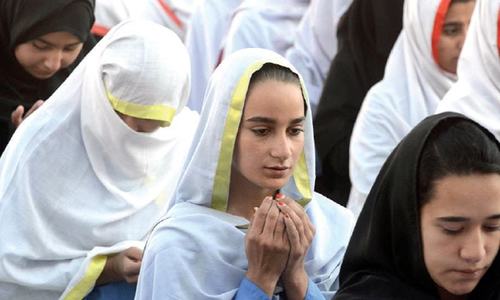THE Khyber Pakhtunkhwa government recently issued and then took back a directive about imposing abaya/burqa or chaddar on all girls coming to and going from (government) schools in some of its districts.
From time to time, a number of public- and private-sector universities have issued guidelines and/or rules for dress codes, usually for women, disallowing jeans, tights, T-shirts, etc on campus. There have been circulars about segregated seating arrangements in classrooms as well as in public spaces within university premises. There have been circulars even on the distance that young men and women are supposed to maintain between themselves even when talking to each other. Some circulars have even tried to minimise or eliminate male and female interactions and conversations.
A recent example was the circular from a university, doing the rounds on social media, asking concerned faculty and departments to ensure that classes are scheduled in a way that students should not have any ‘free’ or unstructured time between classes. It advised that the schedules should also make sure that even the distances students have to move between classes are minimised. Both of these directives are not really to ensure ease for students; they are to ensure that students do not have the time and opportunity to interact with each other outside of class. The circular also instructed faculty to ensure that the number of assignments given to students are increased to the point that students are kept as busy as possible and would not have time for socialising.
These attempts at managing dress, interaction, socialisation and other activities do not stem from the perspective of reducing harassment and/or ensuring a higher quality education — they are actually attempts to police minds. They are attempts at trying to dictate what students should and can think, and how they should and can act. But they are also coming from a place of deep distrust in young people: the youth cannot be trusted to manage their thinking for themselves, they cannot manage their own social lives and they are not to be trusted with unstructured time. Most importantly, these directives are ways of ensuring what the youth in society should or should not think. Unlike what is said by many, I do not think these directives have a lot to do with culture and traditions, or attempts at conserving them.
Attempts to control every aspect of student life betray a deep distrust of young people.
Universities are approached quite regularly (though mostly informally) by various state agencies to inquire about certain on-campus activities of the faculty and students. Various agencies keep an eye on what is taught in universities in general, and sometimes in specific courses as well. Social media, we know, is already heavily monitored in Pakistan and even managed. The generation of trends on social media have been studied to show significant interventions and attempts at management. At times, universities have been told not to hold specific events, seminars and/or conferences. Sometimes agencies have even gone to the extent of trying to dictate which ‘experts’ should or should not be invited for talks, and even which authors should not be taught in universities as opposed to others who are more acceptable.
All of this is definitely not about ensuring student safety, or discouraging harassment, or preserving culture and traditions. They are definitely not attempts to ensure a better quality of education in our educational institutions. They are, quite clearly, attempts to control minds and the development of minds. These are battles to generate and control certain narratives.
Though odious, all this would be without contradiction, but the problem is that we always decry our students getting a poor quality of education, and say that we are not producing people who have the ability to think critically, who have the ability to think for themselves, who can be thought of as action leaders in all fields of endeavour, and who have the ability to raise the quality of our human resource as a whole.
This is the real bind, and the citizens of the country (and I include all decision-makers in the citizenry) need to think hard about this problem. Critical thinking, independent thinking and the ability to take initiative and risk, the ability to work with others, the ability to develop communal approaches — all skills and capabilities that we want our youth to possess — cannot develop when they do not get the opportunity to practise them. We cannot even teach these if students do not get to practise them. It is not a switch that you can turn on and off: now use your critical thinking, now switch it off.
Do we want to develop our youth or not? The Higher Education Commission is trying to add some ‘core’ elements to all four-year undergraduate degrees in the country. The idea behind a core is that it will introduce the students to a whole breadth of courses in the sciences, humanities, arts and social sciences, producing professionals who not only know their own area, but have some exposure to other areas as well, and have the ability to connect things.
Both cannot happen. Either we can produce automatons who cannot think for themselves, or we can try to produce individuals who take responsibility for their own thinking and actions. But if we do not use the space/time we have in schools and universities to provide this canvas to students, how will they ever learn?
We need to have a more open debate on the issues involved. A big question is: who is going to lead and curate the debate? University faculties might have to begin the process and curate the debate, but the discussion will have to become larger and more inclusive. We have to find the right vehicles for doing this.
The writer is a senior research fellow at the Institute of Development and Economic Alternatives, and an associate professor of economics at Lums, Lahore.
Published in Dawn, September 20th, 2019
















































